- Home
- Quizzes
- My Quiz Activity
- Newsletters
- Sports Betting
- MY FAVORITES
- Add Sports/Teams
- SPORTS
-
NFL
- NFL Home
- Arizona Cardinals
- Atlanta Falcons
- Baltimore Ravens
- Buffalo Bills
- Carolina Panthers
- Chicago Bears
- Cincinnati Bengals
- Cleveland Browns
- Dallas Cowboys
- Denver Broncos
- Detroit Lions
- Green Bay Packers
- Houston Texans
- Indianapolis Colts
- Jacksonville Jaguars
- Kansas City Chiefs
- Las Vegas Raiders
- Los Angeles Chargers
- Los Angeles Rams
- Miami Dolphins
- Minnesota Vikings
- New England Patriots
- New Orleans Saints
- New York Jets
- New York Giants
- Philadelphia Eagles
- Pittsburgh Steelers
- San Francisco 49ers
- Seattle Seahawks
- Tampa Bay Buccaneers
- Tennessee Titans
- Washington Commanders
-
MLB
- MLB Home
- Arizona Diamondbacks
- Atlanta Braves
- Baltimore Orioles
- Boston Red Sox
- Chicago White Sox
- Chicago Cubs
- Cincinnati Reds
- Cleveland Guardians
- Colorado Rockies
- Detroit Tigers
- Houston Astros
- Kansas City Royals
- Los Angeles Angels
- Los Angeles Dodgers
- Miami Marlins
- Milwaukee Brewers
- Minnesota Twins
- New York Yankees
- New York Mets
- Oakland Athletics
- Philadelphia Phillies
- Pittsburgh Pirates
- San Diego Padres
- San Francisco Giants
- Seattle Mariners
- St. Louis Cardinals
- Tampa Bay Rays
- Texas Rangers
- Toronto Blue Jays
- Washington Nationals
-
NBA
- NBA Home
- Atlanta Hawks
- Boston Celtics
- Brooklyn Nets
- Charlotte Hornets
- Chicago Bulls
- Cleveland Cavaliers
- Dallas Mavericks
- Denver Nuggets
- Detroit Pistons
- Golden State Warriors
- Houston Rockets
- Indiana Pacers
- Los Angeles Clippers
- Los Angeles Lakers
- Memphis Grizzlies
- Miami Heat
- Milwaukee Bucks
- Minnesota Timberwolves
- New Orleans Pelicans
- New York Knicks
- Oklahoma City Thunder
- Orlando Magic
- Philadelphia 76ers
- Phoenix Suns
- Portland Trail Blazers
- Sacramento Kings
- San Antonio Spurs
- Toronto Raptors
- Utah Jazz
- Washington Wizards
-
NHL
- NHL Home
- Anaheim Ducks
- Arizona Coyotes
- Boston Bruins
- Buffalo Sabres
- Calgary Flames
- Carolina Hurricanes
- Chicago Blackhawks
- Colorado Avalanche
- Columbus Blue Jackets
- Dallas Stars
- Detroit Red Wings
- Edmonton Oilers
- Florida Panthers
- Los Angeles Kings
- Minnesota Wild
- Montreal Canadiens
- Nashville Predators
- New Jersey Devils
- New York Islanders
- New York Rangers
- Ottawa Senators
- Philadelphia Flyers
- Pittsburgh Penguins
- San Jose Sharks
- Seattle Kraken
- St. Louis Blues
- Tampa Bay Lightning
- Toronto Maple Leafs
- Vancouver Canucks
- Vegas Golden Knights
- Washington Capitals
- Winnipeg Jets
- NCAAF
- NCAAM
- Boxing
- Entertainment
- Lifestyle
- Golf
- MMA
- Soccer
- Tennis
- Wrestling
- More Sports
- RESOURCES
- My Account
- YB on Facebook
- YB on Twitter
- YB on Flipboard
- Contact Us
- Privacy Policy
- Terms of Service

Looking back at Super Bowl XXXII: 25 years later
As we look back at all the Super Bowls that have happened, we tend to forget just how special Super Bowl XXXII really was. The game was close throughout, featured one of the best redemption stories in Super Bowl lore, and is an actual turning point to how we viewed this event.
Remember that at this time in NFL history, there seemed to be a clear divide between the two conferences, with one dominating the other, and the Green Bay Packers had the look as the next great NFC dynasty ... following the recent footsteps of the San Francisco 49ers, Washington and Dallas Cowboys. They faced a Denver Broncos team with a young roster but a 38-year-old quarterback who was making his 4th Super Bowl start. It was a beautiful afternoon in San Diego and a very good game.
With it being the 25th anniversary of Super Bowl XXXII, let's take a closer look at what made it one of the most important, albeit sometimes forgotten Super Bowls to date.
Broncos first championship
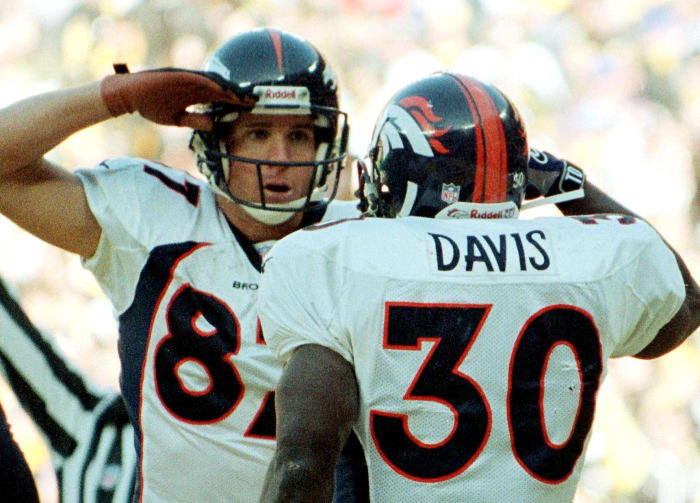
This was the Broncos' fifth trip to the Super Bowl, but their first-ever win in the game. The Broncos lost Super Bowls XII, XXI, XXII and XXIV -- the last three with John Elway as the starting quarterback. Elway was 38 years old when Denver reached Super Bowl XXXII but he had something that he never had in those other Super Bowls -- a great running back. Terrell Davis rushed for over 1,700 yards in 1997, scoring 15 touchdowns (he would rush for 2,008 yards and 21 touchdowns in 1998). Denver also had Hall of Famers Shannon Sharpe, Steve Atwater and Gary Zimmerman.
Denver also had receivers Rod Smith and Ed McCaffrey, the latter now more known as the father of 49ers running back Christian McCaffrey. Other well-known members of this team are lineman Mark Schlereth, defensive end Neil Smith, and linebacker Bill Romanowski. Backup running back Anthony Lynn would go on to become the head coach of the Los Angeles Chargers for four seasons and is currently an associate head coach/running backs coach for the 49ers where he coaches...Christian McCaffrey.
Defending champion Green Bay Packers
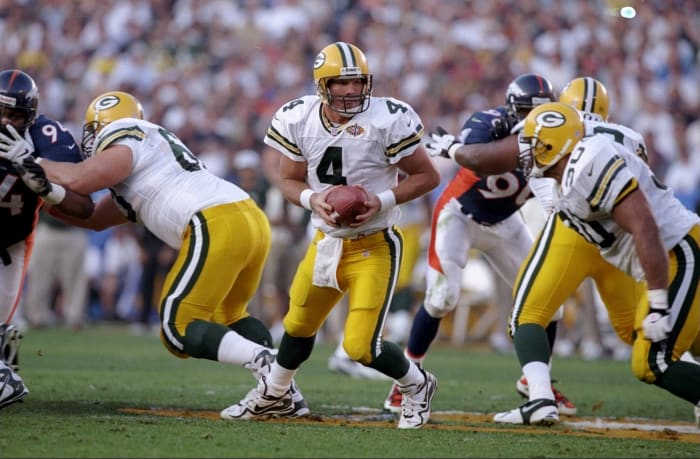
The defending Super Bowl champion Green Bay Packers followed their title with another strong season. The Packers won the NFC Central division title with a 13-3 record, and quarterback Brett Favre became the first player to win three consecutive MVP awards. Eventually, Favre, along with teammates Reggie White and LeRoy Butler, would go on to become a Hall of Fame.
What you couldn't predict then was that this would be the last time Favre would ever reach the Super Bowl. He wouldn't reach another championship game with the Packers until the 2007 season, where Green Bay would lose to the New York Giants in what would be Favre's final game with the franchise. White would play one more season with the Packers, in which he won the league's Defensive Player of the Year award before retiring. After a year off, he would play one season with the Carolina Panthers.
Favre's backup was Doug Pederson, who won a Super Bowl as head coach of the Philadelphia Eagles (Super Bowl LII) and is currently the head coach of the Jacksonville Jaguars. Wide receiver Don Beebe made his sixth and final Super Bowl appearance and joined Antonio Freeman and Robert Brooks to form a lethal receiving corps.
The game was actually good

Back in 1998, Super Bowls had developed a reputation for being a dud of a game.
*7 of the last 8 games were decided by double digits
*13 of the last 15 games were decided by double digits
*11 of the last 14 games were decided by at least 13 points
*8 of the last 14 games were decided by at least 19 points
The Super Bowl had turned into, honestly, a rout most years. This one was not that. The game had a back-and-forth type feel as the Packers grabbed a quick lead before the Broncos scored the next 17 points. The Packers would fight back to tie the game, 17-17, before the two teams traded TDs midway through the second half. The two traded blows before great field position allowed Denver to carve out a game-winning touchdown drive late in the game. Green Bay and their three-time MVP Brett Favre attempted to make a comeback but fell short, and one of the biggest upsets in Super Bowl history happened.
Broncos ended NFC's Super Bowl dominance
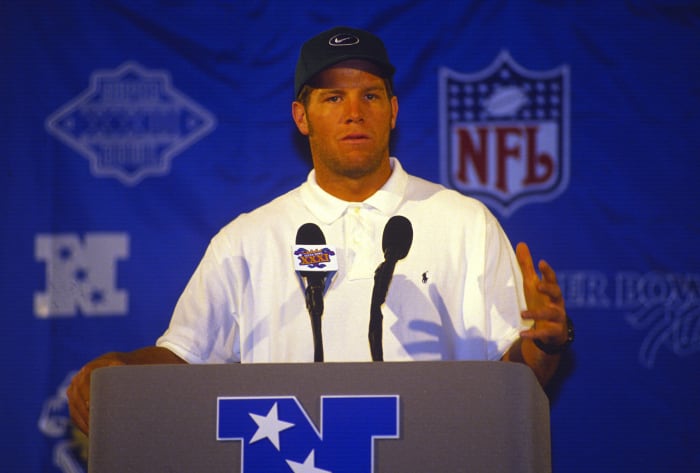
Heading into Super Bowl XXXII, the NFC had won the previous 13 championships and most of those games weren't close. The last time the AFC had won a Super Bowl was after the 1983 season when the Los Angeles Raiders beat Washington in Super Bowl XVIII. The combined scores of those games were 490-219 or an average of 37.7 to 16.8.
It had become a running joke that the AFC was the weaker conference and their champion was the sacrificial lamb to the NFC champ. Not only did the NFC have a 13-game winning streak and won 15 of the last 16. That came after a stretch where the AFC won 11 of 13 Super Bowls... and the Broncos win over the Packers began a run where the AFC would win 4 of the next 5 Super Bowls and 8 of the next 10.
Helicopter play

The play most associated with Super Bowl XXXII is John Elway's "Helicopter Run". With the game tied 17-17 late in the third quarter, the Broncos found themselves with a 3rd-and-6 on the Packers' 12-yard line. Elway went back to pass, but the Packers' broke through the line and forced him up and out of the pocket where he would scamper towards the first down marker. Elway, who was 37 years old, would dive head first and met three Packers defenders who caused him to spin in the air like a helicopter that landed him inside the five-yard line. He got up ... fired up ... and would lead his team into the endzone a few plays later. On the ensuing kickoff, Green Bay's returner Antonio Freeman fumbled the ball away. On the very next play, Elway -- going for the kill -- throws an interception in the endzone to Eugene Robinson.
Not only was the "Helicopter Run" the defining moment of this Super Bowl, but also in Elway's career.
Allowing the touchdown

One of the other plays of historical note was the final score of the game. With the Super Bowl tied 24-24, the Broncos were driving and had reached the one-yard line with 1:47 left in the game. With the Packers having two timeouts remaining, Packers' head coach Mike Holmgren instructed his defense to allow the Broncos to score to preserve time for Brett Favre and Green Bay to make a comeback.
Terrell Davis would punch in a one-yard touchdown score to give the Broncos a 31-24 lead. The Packers' final drive would stall in Broncos territory, giving Denver their first Super Bowl title.
MVP Terrell Davis
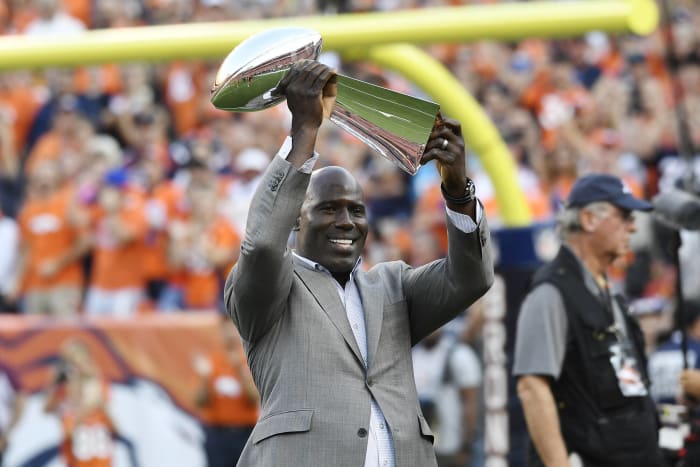
Terrell Davis became the only player to rush for three touchdowns in a Super Bowl and joined Roger Craig, Jerry Rice (twice), and Ricky Watters as the only players to score three TDs in a game (James White would join them in Super Bowl LI. Davis carried the ball 30 times for 157 yards and three touchdowns, winning the game's Most Valuable Player award. His 157 yards remain the 5th best rushing effort in history, trailing Timmy Smith, Marcus Allen, John Riggins, and Franco Harris.
"This one's for John!"
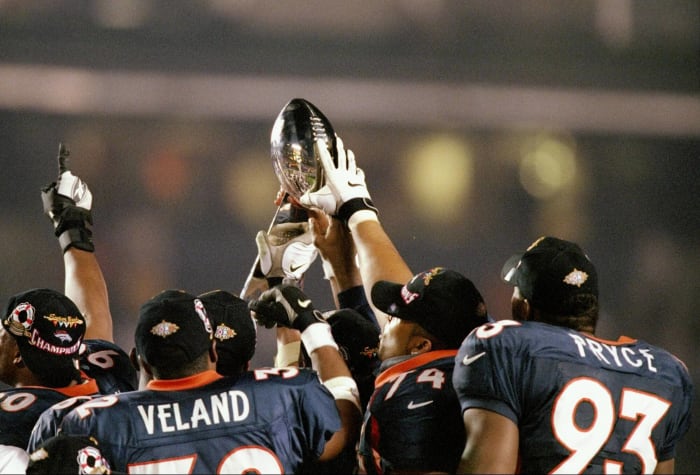
When the Broncos celebrated their victory on the postgame podium, owner Pat Bowlen held the Vince Lombardi trophy up high and yelled, "this one's for John," ... referring to John Elway finally winning the Super Bowl. Early in Elway's career, he reached three Super Bowls, where the Broncos were blown out by the Giants, Washington, and 49ers, respectively. After their loss to the Niners, Denver won just one playoff game over the next seven seasons, including an embarrassing loss to the recent expansion Jacksonville Jaguars in the 1996 postseason when the Broncos were the No. 1 seed. While Elway was considered one of the greatest quarterbacks of all time, his postseason failures were a major part of his legacy.
Until he won Super Bowl XXXII.
Elway would go on to win the Super Bowl the following year and retired after the game. When the Broncos won Super Bowl 50 eighteen years later, Elway (who was the general manager of the team) would proclaim that "this one's for Pat," as Bowlen was suffering from Alzheimer's. Bowlen would pass away in 2019 at the age of 75.
But John didn't have a big game
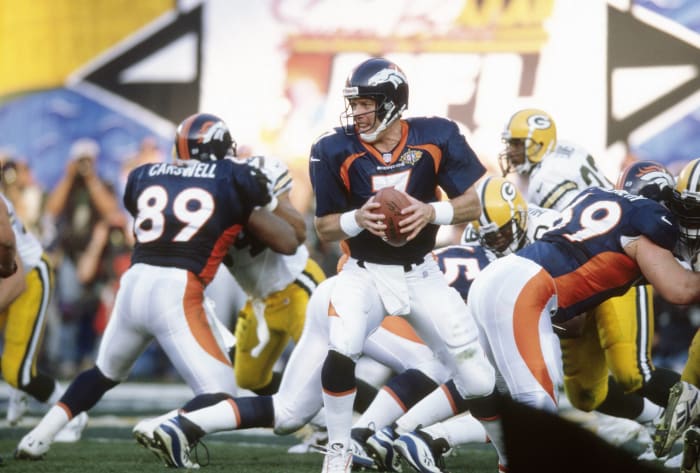
While the "This one's for John" speech, his Helicopter Run and Super Bowl XXXII being his first championship are the main talking points to remember from this game, John Elway didn't have a great game. He completed just 12 of 22 passes for 123 yards, no touchdown passes and one interception. He did run for 17 yards and a touchdown, but his passing prowess was held in check by the stout Packers defense.
A year later, Elway would throw for 336 yards in Super Bowl XXXIII and be named the game's MVP.
Broncos ended four-game Super Bowl losing skid

At that point in Super Bowl history, three franchises were 0-4 in Super Bowls: the Buffalo Bills, Minnesota Vikings, and Denver Broncos. Denver's win in Super Bowl XXXII ended that losing skid. The Broncos lost Super Bowl XII to the Dallas Cowboys, Super Bowl XXI to the New York Giants, Super Bowl XXII to Washington, and Super Bowl XXIV to the San Francisco 49ers. Not only did they lose those games, but they weren't particularly close, as they lost by an average margin of 28.3 points.
Since then, the New England Patriots have also joined the four-loss club, in fact, losing five Super Bowls. The Broncos also joined the five-loss club by losing XLVIII to the Seattle Seahawks, but would also win Super Bowls XXXIII and 50.
Qualcomm hosted Super Bowl and World Series

In 1998, Qualcomm Stadium in San Diego was the first and only stadium to host both the Super Bowl and World Series in the same year. Super Bowl XXXII was the second time Qualcomm (formerly Jack Murphy Stadium) hosted the NFL's championship -- it housed Super Bowl XXII (Washington over Broncos). It would eventually host Super Bowl XXXVII (Buccaneers over Raiders).
That fall, the San Diego Padres would reach the World Series and host Games 3 and 4 of the Fall Classic. The Yankees would sweep the Padres, 4-0, but Qualcomm did a double duty that no other stadium has done before or since.
The Padres continued to play at "The Q" through 2003 before moving into Petco Park. The stadium's last Super Bowl was in 2003, the city lost the Chargers to Los Angeles in 2016, and the stadium was demolished in 2021.
Second wildcard team to win

The 1997 Denver Broncos were just the second wildcard team to win the Super Bowl. Denver finished the regular season 12-4, which was the second-best record in the AFC but a game back of AFC West champ Kansas City Chiefs. The Broncos blew out fellow wildcard team, 42-17, in the first round before winning in Kansas City, 14-10, in the divisional round. Denver won the AFC championship by beating the Steelers in Pittsburgh, 24-21.
Up to that point, the 1980 Oakland Raiders were the only wildcard team to do it when they beat the Philadelphia Eagles in Super Bowl XI. The 1997 Broncos were just the fifth wildcard team to reach the Super Bowl. Since then, the 2000 Baltimore Ravens, 2005 Pittsburgh Steelers, 2007 New York Giants, 2010 Green Bay Packers, and 2020 Tampa Bay Buccaneers have won the Super Bowl as a wildcard team.
From 1970-1977 there were just one wild card team per conference in the postseason. From 1978-1989, there were two wildcard teams; there were three wildcards from 1990-2001 until the NFL realigned into four divisions and knocked the wildcard teams back down to two. Since 2021 the NFL has added a third wildcard team.
On the one
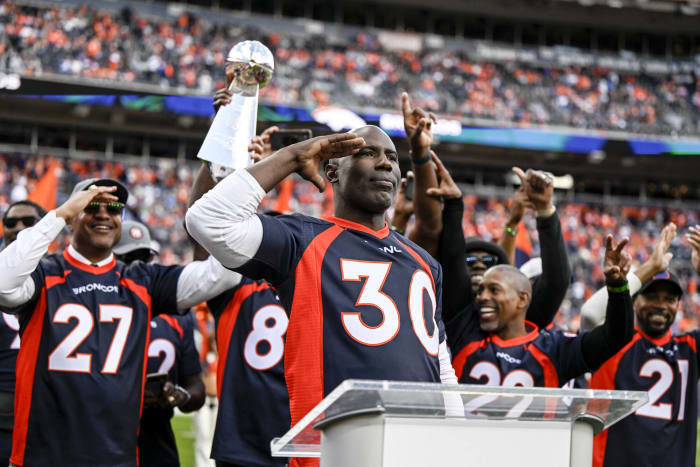
All of the Denver Broncos' touchdowns in Super Bowl XXXII were very similar. Every one of their TDs were rushing touchdowns from the one-yard line. All three of Davis' touchdowns ... which he celebrated with the "Mile High Salute," ... were one-yard rushes and John Elway had a one-yard TD scamper of his own. The four one-yard rushing touchdowns are the most by any team in Super Bowl history.
Packers join list of Super Bowl champs who lost the next year
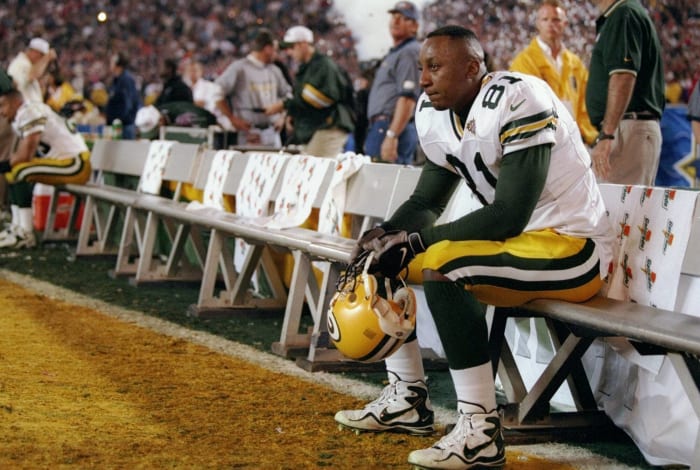
The 1997 Green Bay Packers, who had won Super Bowl XXXI the previous year, became just the third team to lose a Super Bowl the year after winning it. They joined the 1978 Dallas Cowboys (who beat the Broncos in Super Bowl XII, then lost to the Steelers) and the 1983 Washington team (who won Super Bowl XVII over the Dolphins, then lost to the Raiders) on that list.
Since then, the 2014 Seattle Seahawks, 2017 New England Patriots, and 2020 Kansas City Chiefs have accomplished the same feat of losing a Super Bowl the year after winning it. The Packers were attempting to be only the second team ever to win consecutive Super Bowls twice (the Packers won Super Bowls I and II). Only the Steelers have done that.
Extra points

No, not the PAT.
This was Ed Hoculi's first Super Bowl as a referee (he would also ref Super Bowl XXXVIII). Hoculi was one of the most recognizable officials in NFL history, working for the league from 1990 to 2018.
It was also the last Super Bowl broadcast for NBC's Dick Enberg, who would work eight Super Bowls in his career (XV, XVII, XX, XXIII, XXVII, XXVIII, XXX, XXXII). Among the most notable Super Bowls Enberg worked on were the John Riggins' 4th down run on the Dolphins, the '85 Bears' dominance over the Patriots, Montana to Taylor to beat the Bengals and both Cowboys-Bills Super Bowls. He mainly worked with Merlin Olsen or Bob Trumpy for Super Bowls but worked with Phil Simms and Paul McGuire for Super Bowl XXXII.
Throughout Super Bowl history, there have been players who had huge games that are overshadowed by someone else or another event in their Super Bowl. Packers receiver Antonio Freeman caught 9 passes for 126 yards and 2 touchdowns which likely would have won him the MVP award had the Packers pulled out the victory. In two Super Bowls, Freeman caught 12 passes for 231 yards and 3 TDs, one of the most impressive careers in Super Bowl history.
More must-reads:
- Snap judgments: Which NFC rookies will earn the most playing time?
- RB Ezekiel Elliott seems grateful about reunion with Cowboys
- The 'Most career passing touchdowns' quiz
Breaking News
Customize Your Newsletter
 +
+
Get the latest news and rumors, customized to your favorite sports and teams. Emailed daily. Always free!
Use of this website (including any and all parts and
components) constitutes your acceptance of these
Terms of Service and Privacy Policy.

